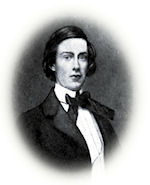
Headquarters 79th Regiment,
Camp Advance, Va. Co. K.
September 21st, 1861.
Dear Cousin Lou:
Let me see — it is a long time since I wrote you, but I am not forgetful. I must thank you many times for your kindness in writing me away off here. Perhaps you think it not very far, only four miles off from Washington; yet it is so, for we are quite shut off from all communication with the outer world. My goodness, how I did cheer Mrs. Gen. Smith the other day on passing her carriage as the Regiment was returning from the field where its colors had been restored!
I am not quite certain that Mrs. Brigadier-Gen. Smith was beautiful, yet I thought her so, for she had little hands, white teeth, and was not shouldering a musket. If you will visit camp, Cousin Lou, I’ll crown you Queen of Beauty and vote you lovelier than a thousand Mrs. Brigadier-Gen. Smiths. Tell Cousin Henry and Dr. Grant that their visit to me, while on Kalorama Heights, first taught me that there was still remaining communication with the world. The result of the lesson was, that I bought a looking-glass and combed the snarls out of my hair.
It is raining to-night, so I am shut in my tent. Field life agrees with me excellently, so that as yet I have hardly had an ill day. Our Regiment has been unusually healthy, there having been no deaths from sickness in it since it first left New-York. A captain of the 19th Indiana Regiment was telling me that they had lost 25 of their number from disease already, although they have not been out here so long as we by two months. This I suppose is partly owing to the fact that the city soldiers endure change of climate better than country ones; and something I believe is due to our surgeon Dr. McDonald. The Doctor says that you are one of the few women for whom he has an unbounded admiration.
You would laugh if you could hear the conversations between our Chaplain and the profane physicians. Our parson is a love of a little man from some back country village, accustomed to be kissed (?), admired, and petted by the ladies of his congregation, and to be regarded as a model of eloquence by the men. Fired with patriotic zeal he volunteered his services on the opening of the war, to his country, and left the peace of home for the horrid din of Mars. But the horrid din of Mars he finds, to his astonishment, not nearly so agreeable as being kissed (?) and petted in his own quiet village. So he has grown petulant, thinks himself unappreciated, and calls all the men hardened sinners because they sometimes look incredulous when he answers their” Why?” with, “It is so for I say so.” Shocking unbelievers! Dear little parson tells us weekly not to fear to die, but to face death bravely, as we are certain of being transported instantly to scenes of heavenly joy. Yet our little parson whenever an alarm occurs, rushes to his tent, secures his bag, and trots off in all haste to the nearest place of shelter. Taking advantage of this little weakness, the Doctor is in the habit of explaining to him in a horridly lucid way, the dreadful nature of gunshot wounds. Then some one will suddenly jump up, assume a listening attitude and cry: “Hark! Was that a gun?” The comical aspect of terror which is thus elicited forms an inexhaustible source of amusement to us all. He reminds me of the Chaplain of the story, who bade the soldiers before the battle not to fear, as they would assuredly that night, if they fell, sup in Paradise. He himself however, ran away when the first shot was fired. An indignant hearer of his morning discourse reminded him of his encouraging promises. “No thankee,” said he, “don’t talk to me, I never did like suppers.” All of which story you can anywhere find better told in the newspapers.
Next to the parson, our greatest source of entertainment is the article called “nigger,” a thing I never saw until I came to “Ole Virginny.” We own an African of the Pongo species, a sort of half idiotic monkey-man, partially possessing the gift of speech, and totally possessing the gift of doing nothing. I consider it a curious study to see how, when he is ordered to perform any service, he manages most ingeniously not to do it at all. You should see the Pongo, though, in the Highland costume. “The What Is It ?” will have to retire from business.
Good-bye dear Cousin Lou.
Very affec’y.,
W. T. Lusk,
Lieut. Co. K. 79th Regt.


